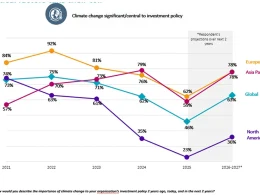ESG funds managed by global firms have allocated over $1.4 billion to 14 electric vehicle (EV) and solar companies allegedly connected to forced labour in China’s Xinjiang region, according to Ignites Asia.
The analysis of Morningstar data by Ignites Asia, a news service by Financial Times, shows $1.1 billion of these investments directed to Contemporary Amperex Technology Co. Ltd. (CATL), the world’s largest EV battery manufacturer. CATL’s operations have come under increasing scrutiny from policymakers and academics.
In June, the US House Select Committee on the Chinese Communist Party presented evidence linking CATL to state-sponsored forced labour and human rights violations in Xinjiang. A separate report from the Helena Kennedy Center for International Justice in the UK also flagged concerns over CATL’s 2022 expansion into the region, suggesting potential links to forced labor in its supply chain.
CATL has denied the allegations, labeling them “groundless and completely false.”
Among ESG investments, $789 million comes from actively managed funds, while $263 million is tied to passive funds. Major investors include BlackRock, Nordea, and Ninety One, which hold $148 million, $93 million, and $86 million in CATL, respectively.
BlackRock and Ninety One declined to comment, while Nordea’s head of responsible investments, Eric Pedersen, emphasised their due diligence efforts. Pedersen noted CATL’s November 2024 statement denying ties to Xinjiang-based suppliers and clarified that the company sold its stake in Jiangxi Zhicun, a related entity, in March 2023.
Critics argue that such investments undermine the principles of ESG funds. Chloe Cranston of Anti-Slavery International stated, “There’s no such thing as a sustainable investment if it’s based on Xinjiang forced labour.” Sam Goodman of the China Strategic Risks Institute added that ESG investing must balance environmental goals with human rights, urging asset managers to reassess their strategies.
Some experts advocate for sector-wide divestment to mitigate risks and avoid individual targeting. However, transparency challenges and concerns over retaliation from the Chinese government complicate divestment efforts.
Despite these challenges, calls for stricter ethical oversight in ESG investments are intensifying as global scrutiny of Xinjiang-linked companies grows.





















